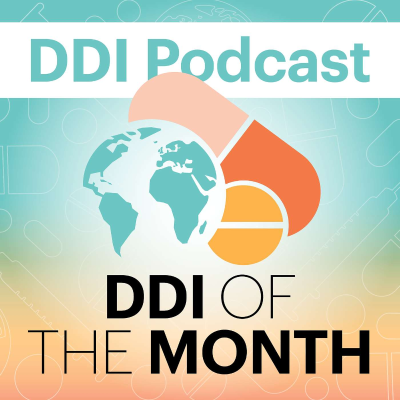
DDI of the Month Podcast
Podcast af Global DDI Solutions
Presented by Global DDI Solutions in collaboration with Academic Medical Education, the DDI of the Month podcast brings you the latest updates on drug...
Prøv gratis i 7 dage
Efter prøveperioden kun 79,00 kr. / måned.Ingen binding.
Alle episoder
5 episoderIn our latest episode, we dive into an important study by Dr. Massimo and Dr. Gianluca which examins the agreement between different drug interaction checkers (ICs) when evaluating interactions involving widely used proton pump inhibitors (PPIs). PPIs are frequently prescribed for treating acid-related conditions and preventing medication-induced ulcers, especially in older patients with multimorbidity and polypharmacy. These interactions are often complex, involving increased gastric pH (reduction of absorption) and metabolism through CYP3A4 and CYP2C19 enzymes. However, this study reveals significant inconsistencies between the summary of product characteristics (SPCs) and five individual widely-used ICs. The podcast covers: - How different ICs (like INTERCheck WEB, Micromedex, Lexicomp, Epocrates, and drugs.com) identify and classify potential interactions with PPIs (including omeprazole, esomeprazole, lansoprazole, pantoprazole, and rabeprazole). - The alarming discrepancies between the IC data and official product summaries (SPCs), and how this impacts clinical decision-making. - Why healthcare professionals should use multiple sources and collaborate closely in managing complex medication regimens, especially in elderly patients. Listen to learn more about the findings of this study and how to improve patient safety and ensure the accurate identification of drug interactions that can affect patient outcomes.
The fourth episode will delve into the use of artificial intelligence (AI) to optimize medication alerts generated by clinical decision support systems (CDSSs). David Burger will discuss the review findings and future opportunities with Jetske Graafsma and Dr. Patricia van den Bemt. Medication safety is crucial, and preventing adverse drug events (ADEs) is a key aspect. Clinical decision support systems (CDSSs) in electronic health records help reduce the risk of ADEs by generating alerts for dosages, DDIs, contraindications, duplicate therapies, drug allergies, and intolerances. However, the high volume of alerts can lead to alert fatigue, potentially causing important alerts to be missed. In a recent scoping review, Graafsma et al. provided an overview of 10 studies on the application of AI to optimize medication alerts from CDSSs in hospital settings. AI is a promising yet relatively new healthcare tool, and thorough external validation is often needed before its implementation. The upcoming podcast will discuss the review findings, AI’s potential for improving CDSS, and its practical implementation. We’ll also hear Jetske and Patricia’s insights on alert fatigue and future research opportunities.
In the third podcast, Dr. Burger discusses the added value of reporting outcomes of real-world cases in patients with HIV caused by drug-drug interactions (DDIs) with Dr. Ambrosioni and Dr. Molto. Several databases are available for DDI management, with discrepancies often occurring between the databases. The differences may be caused by extrapolations from studied interactions to predict the DDI potential for unknown drug combinations. The relevance of the unstudied DDIs is often unknown. Reporting the outcomes of real-world cases can determine the relevance of DDIs. The article discusses real-world cases between antiretrovirals (ARVs) and comedications reported on www.clinicalcasesDDIs.com [https://www.clinicalcasesddis.com/]. Twenty percent of the reported cases involve over-the-counter drugs, which are often not recorded in patient files. The following topics will be discussed during the podcast: - the challenges of DDI management of ARVs with comedications; - the added value of reporting outcomes of real-world cases; and - the underestimated risks of over-the-counter (OTC) drug use. Listen to the podcast for all the tips and take-home messages! Read the full article here: https://link.springer.com/article/10.1007/s40121-024-00935-0 [https://link.springer.com/article/10.1007/s40121-024-00935-0]
In the second episode of this podcast series, Dr. Malone, Dr. Gómez-Lumbreras, and Dr. Burger will discuss the drug-drug interaction potential of colchicine, which may be underestimated. Dr. Malone’s research group did a study on real-world data on the interaction potential of colchicine. Colchicine concentration can be increased by CYP3A4 inhibitors, which may lead to toxicity and adverse events. Adverse events cases reported between 2004 and 2020 were studied for the involvement of colchicine in DDIs. In 66% of 787 studied reports, colchicine was identified as a concomitant drug. This indicates that the reporter did not think colchicine was the cause of the adverse events mentioned in the reports. * Could colchicine possibly play a bigger role in DDIs than currently thought? * Are there any safety concerns of colchicine use combined with strong CYP3A4 inhibitors? * And what practical guidance is needed for the safe use of colchicine in combination with other medicines? Listen to the second episode of DDI of the Month to find out!
In the first exciting episode of this new podcast series, Dr. Iversen and Dr. Burger will dive into DDIs with flucloxacillin, and explore the results of Dr. Iversen's research trial. Dr. Iversen’s research group has studied the extent of induction of flucloxacillin of the CYP enzymes in healthy adults and 3D spheroid of primary human hepatocytes (PHHs). The research group performed a randomized, unblinded, two-period, cross-over, clinical pharmacokinetic (Basel) cocktail study with twelve healthy adults. During the podcast, the study will be discussed in detail. Find out the interesting results of this study!
Tilgængelig overalt
Lyt til Podimo på din telefon, tablet, computer eller i bilen!
Et univers af underholdning på lyd
Tusindvis af lydbøger og eksklusive podcasts
Ingen reklamer
Spild ikke tiden på at lytte til reklamepauser, når du lytter til Podimos indhold.
Prøv gratis i 7 dage
Efter prøveperioden kun 79,00 kr. / måned.Ingen binding.
Eksklusive podcasts
Uden reklamer
Gratis podcasts
Lydbøger
20 timers / måned



















